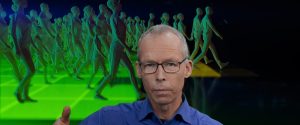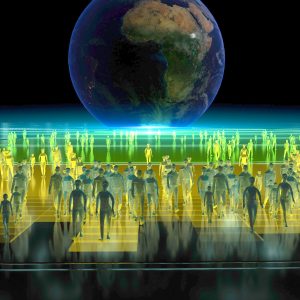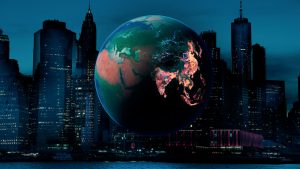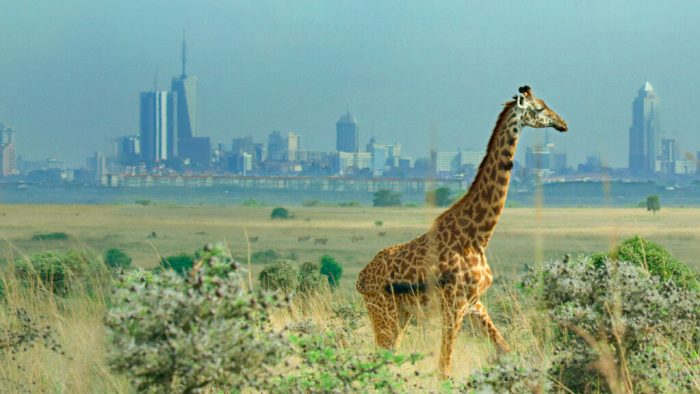Movie Review: ‘Breaking Boundaries —The Science of Our Planet’
Reviewed by Jeffrey Sanzel
Netflix’s Breaking Boundaries: The Science of Our Planet explores the idea that humanity has pushed the planet beyond survival and sustainability. While ably hosted by the ever-reliable Sir David Attenborough, the dominant voice is Swedish Professor Johan Rockström, an informed and articulate scientist with a range of facts and concepts that he introduces over the one hour and fifteen-minute running time.

There are few topics — if any — more important than the future of Earth. And while some make claims against it, climate change, global warming, and other man-driven destructions are real and present dangers, ones that seem to be growing geometrically. This documentary attempts to explain these issues by setting down a theory of boundaries. It then proceeds to explain how they are being crossed.
Breaking Boundaries opens with a discussion of the stability of Earth’s temperature and climate for 10,000 years; this allowed for the development of the modern world. The documentary then proceeds to cite examples of our destructive behaviors and how they have negatively impacted various ecosystems, including the Amazon, the Great Barrier Reef, etc. Rockström’s refrain is, “It is not about the planet. It is about us. About our future.” Perhaps he is trying to appeal to our self-centered nature rather than our desire to correct what we have broken. Unfortunately, his slightly skewed sense of humanity is probably well-founded.
The film starts with a glimmer of hope, but five minutes in, the bad news is announced: over the past fifty years, we have pushed ourselves out of the norm that existed the previous 10,000 years. And there may be no fix for this situation.
Over the next fifty minutes, a disjointed narrative attempts to explain the nine planetary boundaries — the distance from the safe zone to the danger zone to the high risk/critical zone. Carbon dioxide in the atmosphere has caused droughts, heatwaves, forest fires, and flooding. Ocean acidification, the dangers of aerosols, and novel entities of human pollution are just some of the ideas introduced. Thus, there is an immediate need not just to reduce but to fossil-free within three decades.

Scientists meditate on the destruction of the icecaps, evaluate the reduction of flora and fauna to the point of extinction, and offer a great number of numbers that sometimes seem like … a great number of numbers. (Overwhelming statistics and an extraordinary list of theories make for a bit of confusion.) Finally, the film circles back to the four boundaries that have been crossed and possibly irrevocably (but maybe not?): climate, forest loss, nutrients, and biodiversity.
Every bit of this is important information. But the problem comes down to this: Breaking Boundaries is a documentary dealing with a life-and-death topic in a clumsy and wrong-headed approach. Director Jonathan Clay has underestimated his audience, deciding that an MTV assault is the only way to connect. As a result, the bells and whistles drown out the material. Yes, they are alarm bells and fire whistles, but this is an onslaught, not an explanation.
One talking head goes so far as to refer to the “Mad Max future.” A drinking game based on the repetition of “tipping point” and “irreversible” would put the players out in under twenty minutes. There is probably truth in every statement and comment. But judicious editing would have allowed for a variety of tactics, rather than what comes across as a relentless, one-note attack.
The effects are overwhelming and non-stop, with even the most sedate moments backgrounded with a strange light show. (Was this Mr. Clay’s first time with a green screen?) The graphics seem to be inspired by the 1980s’ Tron. Or perhaps Saturday Night Fever. Everything explodes on screen, making for restless, jittery filmmaking. The result wholly lessens the film’s integrity.
Many moments succeed in capturing the beauty of nature. If a bit generic, they serve as a strong reminder of what is being destroyed. Some disturbing images are not sensational but instead are telling: wild animals who now live close to settled and “civilized” areas are shown in droves on highways and the environs of cities. While we are always warned not to anthropomorphize, there is a palpable fear in their eyes.

There are two moments of resonating humanity. First, a scientist discussing the bleaching of the Great Barrier Reef becomes choked up, clearly a spontaneous and honest reaction to what he has seen. Second, a conservationist revisits one of the sites where she had studied birds before its incineration. The destruction of fifty million acres of Australian land caused the displacement or death of an estimated three billion animals. While she looks at the bleak landscape, she says, “This is an ecological catastrophe.” But this is also highly personal and, again, powerful in its simplicity.
If only the director had trusted moments like these. Instead, he chose window dressing that makes the experience a late-night infomercial for the predictions of Nostradamus.
After fifty-nine minutes of apocalyptic prognostication, there are twelve minutes of “but-it-can-all-be-saved.” We need to bend the global curve of emissions, cutting 6 to 7% per year. We can draw down the carbon by planting more trees. Changing our diets to healthy foods will contribute to the saving of the planet. We can eliminate waste by turning the linear cycle into a circular one by recovering raw materials (and benefit the economy). Finally, we must turn towards renewable energy. “The window is still open.” Rockström believes that 2020 to 2030 is the decisive decade: what happens in these ten years will determine what happens over the coming centuries.
Perhaps there is no longer a way to make people listen — and more importantly, take action — without being sensationalist. However, this film will win no converts and will probably not engage the already aware and committed. The call is to act as “earth’s conscience — it’s brain — thinking and acting with one unified purpose — to ensure that our planet forever remains healthy and resilient — the perfect home.” It is not just a noble purpose but an essential one. There have been, and there will be many valuable examinations of this subject matter. Unfortunately, in the end, Breaking Boundaries is not one of them.







